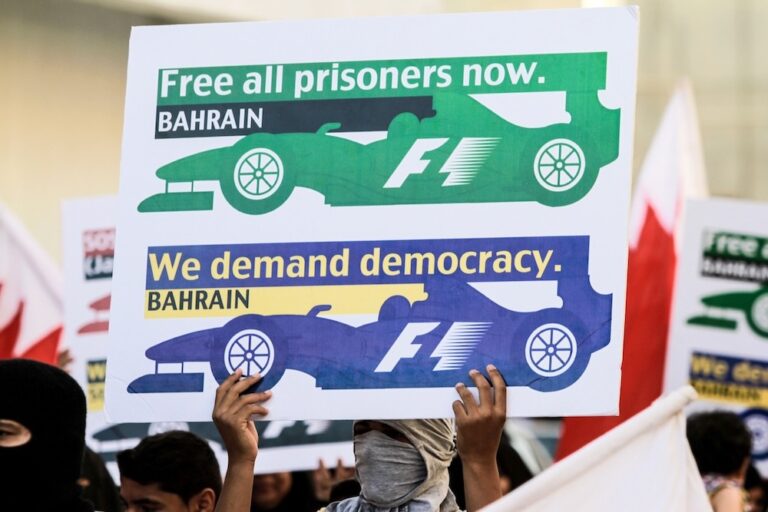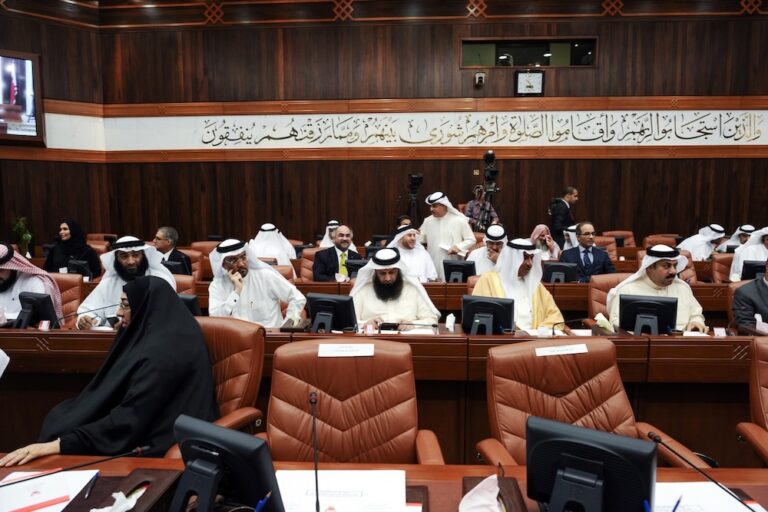Rajab was found guilty of libeling the citizens of the town of Muharraq in a case that is linked to six tweets he posted on 2 June 2012 that were solely directed towards the Prime Minister of Bahrain, calling on him to step down and highlighting his corruption.
UPDATE: Three months’ jail sentence confirmed (BCHR, 4 August 2012)
(BCHR/IFEX) – 9 July 2012 – The Gulf Center for human Rights (GCHR) and Bahrain Center for Human Rights (BCHR) express their concerns regarding the continued campaign of judicial harassment against leading human rights defender Nabeel Rajab and his recent arrest and detention for views and statements he expressed over Twitter.
Nabeel Rajab is the President of BCHR and Director of GCHR. He has a very popular twitter account with more than 158,000 followers, which he uses to express his views regarding ongoing, widespread human rights violations in Bahrain.
Today, the 5th lower criminal court convicted Rajab of libeling the citizens of the town of Muharraq and sentenced him to three months in prison, in a case that is linked to six tweets he posted on 2 June 2012, that were solely directed towards the Prime Minister of Bahrain calling on him to step down and highlighting his corruption. At around 1:30pm today, 9 July, Nabeel Rajab was arrested from his house, which was surrounded by police cars. Masked men in civilian clothes and wearing police jackets entered his house and pulled him forcibly away. The arrest was caught on video.
The libel case against Nabeel Rajab was filed in the name of Muharraq’s citizens by people who are part of or affiliated with the government, including Adel Flaifel, the former officer of the national security apparatus, who is accused of allegedly torturing political activists and who has directed threats in the recent months against Rajab and other human rights defenders. Others who filed the case include Saleh Bin Isa Bin Hindi, a consultant to the King of Bahrain, as well as some former security officers.
Rajab’s lawyer had said the most severe penalty in libel cases was usually a fine. The lawyer has appealed the sentence.
Rajab has been detained previously between 6 and 27 June 2012 on the same case. He was also detained between 5 and 28 May 2012 in relation to another case where he is accused of defaming an official authority over Twitter, in which the judge ruled against Rajab on 27 June 2012 and ordered him to pay a fine of 300 Bahraini dinars (approx. US$795).
Additionally, Rajab is still facing two charges, in ongoing trials where he faces the potential of more prison time. The two cases are as follows:
1- Participation in illegal gathering and calling for a march without prior notification, in Manama, postponed to 26 September 2012.
2- Involvement in illegal practices and incitement to gatherings and calling for unauthorized marches through social networking sites, postponed to 19 July 2012.
GCHR and BCHR condemn in the strongest terms the arrest, detention and trial of Nabeel Rajab. We believe strongly that his arrest is part of an ongoing campaign of judicial harassment against him in order to prevent him from continuing his legitimate and peaceful human rights work.
GCHR and BCHR respectfully remind the Bahraini authorities that the United Nations Declaration on the Right and Responsibility of Individuals, Groups and Organs of Society to Promote and Protect Universally Recognized Human Rights and Fundamental Freedoms, adopted by consensus by the UN General Assembly on 9 December 1998, recognises the legitimacy of the activities of human rights defenders, their right to freedom of association and to carry out their activities without fear of reprisals.
We particularly draw their attention to Article 5 (b) which states that: “For the purpose of promoting and protecting human rights and fundamental freedoms, everyone has the right, individually and in association with others, at the national and international levels: (b) To form, join and participate in non-governmental organizations, associations or groups;” and to Article 12.2, which provides that “the State shall take all necessary measures to ensure the protection by the competent authorities of everyone, individually and in association with others, against any violence, threats, retaliation, de facto or de jure adverse discrimination, pressure or any other arbitrary action as a consequence of his or her legitimate exercise of the rights referred to in the present Declaration.



